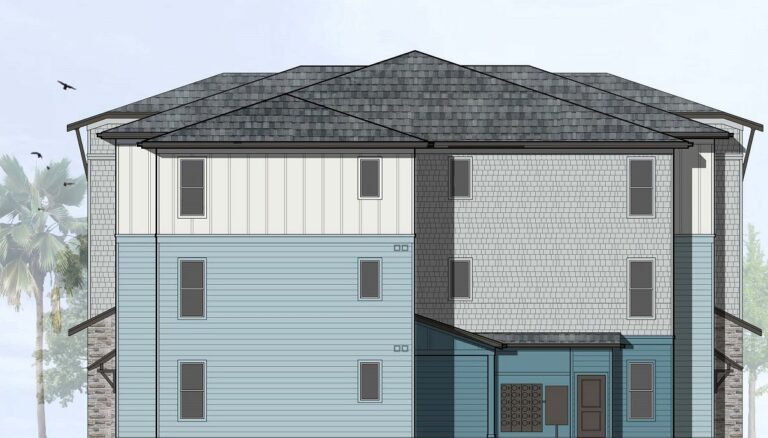By Laura Kinsler Growthspotter
Nov 15, 2022 at 5:00 pm
The developer asked the Osceola County School Board to waive $1 million in school impact fees for the 96-unit affordable housing community on Shingle Creek. (Handout)
On a night when dozens of school teachers pleaded for higher pay to keep up with rising inflation and rent, Osceola County’s School Board had an opportunity to help put a dent in the county’s affordable housing shortage, but it delayed action.
That night, Tim Wheat, vice president of Pinnacle Housing attended the meeting to appeal the School District of Osceola County’s denial of the request to waive school impact fees for the company’s newest apartment community. Pinnacle at the Wesleyan would provide 96 apartment homes for low- and extremely low-income families in the city of Kissimmee and has already received a competitive 9% Low Income Housing Tax Credit from the Florida Housing Finance Corporation. But Wheat said the company is still struggling to make the numbers pencil out for the $32.8 million project and has had to push back its construction start, which was scheduled to start in the first quarter of 2023.
“The economic crisis and inflation has hit us,” he said. “Our costs from the time we applied to Florida Housing for these incredibly valuable tax credits in late 2020 have risen 59% on the hard construction side between then and now.”
As a result, Wheat said Pinnacle approached Osceola County and the City of Kissimmee to request assistance or gap financing. Earlier this year, Osceola Commissioners approved $26.75 million in gap financing for three affordable housing communities that will provide a combined 500 residential units in the county.
Pinnacle also applied to the school district for a waiver of the $12,165 per unit impact fees, which total about $1 million for the project. Though the application met every criterion set out in the county ordinance, the district rejected it because there was no alternative source of funding to offset the cost.
The district rejected similar requests this year from Banyan Development Group and Lincoln Avenue Capital for the same reason.
In fact, since the State of Florida granted county school boards the discretion to waive impact fees for affordable housing, Osceola County has only used that authority once. And that was 20 years ago to the Catholic church.
The school board’s decision to table the Pinnacle appeal marked a potential policy shift. The board had already instructed Planning Director Rhonda Blake and attorney Frank Kruppenbacher to schedule a follow-up meeting with the Lincoln Avenue Capital’s team to discuss different approaches to the matter. Kruppenbacher indicated he would also reach out to Wheat for a follow-up meeting, though that hasn’t happened.
Because of the still-pending appeal, the district declined to speak with GrowthSpotter for this article.
School Board member Julius Melendez said he wants to learn more about how the district could defer school impact fees for affordable housing. (Handout)
Board Member Julius Melendez wants the SDOC to be a part of the affordable housing solution.
“For us to ignore it completely wouldn’t be following through on the Legislature’s intent,” he told GrowthSpotter. He wants the district to partner with Osceola County and its two cities to create a coherent policy.
Not only does Osceola County charge the highest school impact fees in the state of Florida, but its lack of incentive for affordable housing is an outlier in the region. Orange County amended its school impact fee ordinance in 2020 to allow for a waiver of school impact fees for affordable housing, as long as the developer enters an agreement with the county and school district. The City of Orlando also discounts its transportation, parks and sewer impact fees for qualified projects.
Polk County has had a similar policy in effect since 2007 and has waived a total of $8.7 million in impact fees over that time. The incentive is codified in Polk’s Affordable Housing Incentives Implementation Report.
A recent study by the Florida Legislature’s Office of Economic and Demographic Research found that nearly 30% of governments that charge impact fees waive them in part or in whole for affordable housing. Miami-Dade and Highlands are among the counties with exemptions for affordable housing.
Collier, Clay and Martin counties are among those that offer school impact fee deferrals for affordable housing. In those cases, developers may be required to pay the full impact fee, but the cost would be spread out over several years or at the end of the affordability period.
Melendez told GrowthSpotter he was initially open to considering an impact fee discount for affordable housing, but once he learned about the option of deferring the fees, he preferred that approach.
“The deferral wasn’t a part of the original terms and negotiations,” he said. “I do believe there’s an appetite for it at the district.”
Osceola School Board Member Jon Arguello said voters would be furious if the board gave developers “a pass” on school impact fees. (Handout)
During the appeal hearing, School Board member Jon Arguello said he would have a difficult time justifying a vote to grant the impact fee waiver to Pinnacle when the board has rejected appeals from other developers. “How do we say yes to you after saying no— twice since I’ve been here?” he said. “We’ve said no to developers. So how do we say yes today? They’ve come with the same argument. The law hasn’t changed. Nothing’s changed. So that’s a hurdle, right? I like the deferral plan. I think that that’s fair.”
Two new school board members will be seated in December.
Melendez said he wants to see how other counties structure their deferral programs and use that as a template.
He suggested the developer might pay 25% of the impact fee upfront and the remaining 75% in future installments. That way, the district would still collect the full impact fee over time, and the developer would be able to stabilize the property and pay the future installments with its rental income.
The contingency would be that the future installments would have to be a lien on the property, so if it changes hands the full amount would be due at closing, he said.
Arguello said his bigger concern would be the blowback the board would get from voters if they give Pinnacle a waiver or discount on impact fees.
“I think that the two biggest issues are, one is I think that the public would be outraged if we gave you the pass,” he said. “And two, we’ve already said no. So let me ask this question to the attorney. If we say yes to them, are these other developers not going to have a claim?”
Kruppenbacher said he hopes to come back with a proposal after meeting with Lincoln and Pinnacle, but “that’s the multimillion-dollar decision.”





